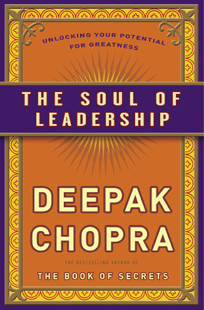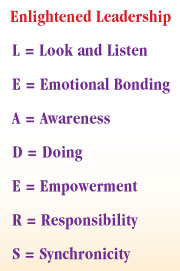- Home
- Media Kit
- Current Issue
- Past Issues
- Ad Specs-Submission
- Ad Print Settings
- Reprints (PDF)
- Photo Specifications (PDF)
- Contact Us

![]()
ONLINE
Enlightened Leadership
Editors’ Note
Deepak Chopra (www.chopra.com) is a world-renowned authority in the field of mind-body healing and a best-selling author, as well as the host of the popular weekly Wellness Radio program on SiriusXM Stars. Dr. Chopra has authored more than 55 books, including 14 best sellers on mind-body health, quantum mechanics, spirituality, and peace. His New York Times bestseller Peace Is the Way won a prestigious Quill Award, and The Book of Secrets was awarded the grand prize at the 2005 Nautilus Book Awards. He is a columnist on faith for the San Francisco Chronicle and Washington Post and contributes regularly to Intent.com and the Huffington Post. Dr. Chopra is a fellow of the American College of Physicians, an adjunct professor at Kellogg School of Management, and a senior scientist with the Gallup Organization. Previously, he served as Chief of Staff at Boston Regional Medical Center. He received his medical degree from the All India Institute of Medical Sciences and did his internship at Muhlenberg Hospital. He then completed various residencies and fellowships at university-affiliated medical centers in Boston.

When you look at the writing of your new book, The Soul of Leadership: Unlocking Your Potential for Greatness, what made you feel the timing was right and what is your mission and vision for it?
We have a few exceptional leaders in the world in all areas, like in the business world with Bill Gates; Warren Buffet; the CEO of Frito-Lay, Al Carey; and the CEO of Men’s Warehouse, George Zimmer. In the political arena, we have leaders like Nelson Mandela and Oscar Arias in Costa Rica. In the spiritual field, we have the Dalai Lama, Bishop Tutu, and Mother Theresa.
For years, I have been studying the qualities of great leaders historically and in contemporary times, and I have been looking at President Obama for a while.
I have also been teaching the Soul of Leadership at Kellogg Business School for the past nine years.
I thought this was an appropriate time to put out something that is very concise, almost formulaic, because I believe we all have the skills for this greatness I feel leaders embody when they unlock their full potential and also help their followers do the same.

How do you define enlightened leadership?
When I teach leadership at businesses or at the executive course at Northwestern, I take them through a process where they first Look and Listen to their own selves – through their bodies and their minds; body means observation, so I teach them observation and listening skills. Then I take them through the mind, where we go through the process of rational analysis; and then the heart, with feeling; and finally, the soul. I teach them how to incubate in stillness.
Before that, I ask them simple questions, and tell them to write down the first three words that come to mind: What kind of business or organization do I want to lead? What kind of society do I want to see? What kind of world do I want to see? Can I play a role in creating that?
Then I take them through very personal questions: What creates joy for me or what are my peak experiences? What is my purpose? What kind of contribution do I want to make to my organization or to the community or to society at large? What are my unique skills and strengths?
I take them through a process where we identify five strengths; it’s based on the Gallup StrengthsFinder originally, but I modified it. Of all the strengths, you have three or four.
What is a meaningful relationship to me personally and professionally? What is a friendship? Who are my mentors, heroes, icons, in history, mythology, religion, and business?
Based on this, I create a soul profile instead of a bio. This is the first part of their listening process; they have a clear vision after this. Once they have a vision, they’re part of a team or a group.
I collect all of this information and project it onscreen. They all realize their collective vision is much bigger than they had ever imagined. They’ll say, I thought we wanted to have success this coming year and improve our stock value, but actually, we want to change the world. They’re totally inspired and I haven’t told them a thing – it’s all coming from them.
Then we address Emotional Bonding, and the best examples of that are sports teams. The most successful sports teams enjoy an emotional bond. The difference between the team that wins the Super Bowl and the one that doesn’t is not the skills – it’s that extra thing that one team has.
So I go through the mechanics of what creates an emotional bond. When people are bonded with you, they want to perform, they want to share in the vision, they want to hang out together – they are unstoppable. I have data to show that when people are bonded, engagement, performance, and well-being improve because they support each other.
Once they’re convinced of that, I teach them how to communicate in a way that does not introduce violence – conflict resolution skills. Then we examine what is emotional intelligence is: it’s self-awareness, self-management, social awareness, and then management of relationships.
I teach them how to get rid of their own emotional toxicity. There are only five emotions and everything else is a variation of that: happiness, sadness, anger and hostility, fear, and guilt and shame.
And I show them how when they are feeling joyful and energetic, everything changes.
Awareness is of two things: what is needed and what is the best response.
We go through an expanded list of Abraham Maslow’s hierarchy of needs: security, achievement, cooperation, love and belonging, self-esteem, intuition and creativity, higher guidance, and ultimately spiritual. We note the responses to each of these needs.
So based on that leadership, they might have particular skills: protector, motivator, achiever, entrepreneur, team builder, nurturer, innovator, guide, and sage.
These are the skills you need – you need to be a flexible leader, depending on the response, and then we go through the response.
A leader is not just a philosopher – he has to prove and get results. So Doing is action orientation – taking initiative, taking calculated risks, responding to feedback – and we created SMART goals: S for stretch more than you can reach; M for be sure you’re measuring everything; A for agree on what you’re going to measure with your team; R for keep a record of everything as you go along; and T for setting time limits or you won’t get there.
Empowerment addresses the idea that people who are empowered are not personally affected or offended by criticism. They are responsive to feedback at the same time and tend to be independent of the good and bad opinion of others; they usually have a lot of self-esteem because they are living up to their values, which we derive from their soul profile; and they’re using their strengths. If somebody is not using their strengths, they don’t do well.
If you’re in a job situation where your supervisor or superior ignores you, your disengagement goes up by 45 percent. If he or she criticizes you, your disengagement drops to 20 percent because you’d rather be criticized than ignored. On the other hand, if your strengths are being noticed, your disengagement falls to less than 1 percent. This is all from Gallup, where I’m also a senior scientist.
I reinforce this immunity to criticism by showing them every time they are offended, how these emotions trigger a response in the body, and I show them how to witness this response and keep witnessing it until it goes away instead of reacting to it.
Responsibility is about being responsible for anything that goes wrong and giving credit to everyone when things go right – those are traits of a great leader.
In addition, responsible leaders make sure they declare their investment in the organization or the community, which is what they’re going to bring in terms of their resources, what they’re going to risk, what kind of energy they’re going to bring, what kind of goals they’re going to set, and listing the same thing from their team: What kind of energy are you going to invest, what kind of time, what kind of network and contacts do you have, and what kind of relationships?
So we recruit everybody’s investment in this thing. And it’s not, you are responsible for this – you tell me what you are responsible for.
Synchronicity is where I bring in spirituality, because if you talk to successful leaders, they will frequently say, I happened to be in the right place at the right time or there are many coincidences.
I show them that their whole life is a series of coincidences and how to become more aware of the unusual in our life where we feel supported, and how the coincidence is a message.
I teach them how to develop non-local skills, which means when you go beyond your personal ego, you enter a universe and domain of awareness where you literally eavesdrop on what is happening, and that I teach through meditation.
Is leadership in the United States broken today?
In general, it’s a catastrophe and now we’re paying the karmic debt of that type of catastrophe on Wall Street, with so many businesses folding up, in the fact that the economy has deteriorated, and in that our economy is not really based on value but on speculation, and a lot of people wanting to make money just to make money.
You have to pursue excellence and ignore success; then you’ll see how successful you will become.
You believe President Obama is the exception to the broken political structure in Washington. How so?
He is definitely a great leader. If I was going through the seven letters I went through in terms of where he could improve, it would be Emotional Bonding.
He seems distant and elitist to a lot of people. He is sometimes not emotionally connected, and yet on certain occasions, he comes through.
He could pay more attention as to why Sarah Palin is so connected with people. She resonates emotionally with people who are at her frequency. Then he would have a much bigger grassroots support.
Nonetheless, President Obama is still very centered, sober, and clear in his vision, and with all the resistance he gets, he still gets through.
It’s hard to believe that almost 50 percent of the U.S. workforce is disengaged. Does that surprise you?
It’s even more: 20 percent is actively disengaged, which means people come to work unhappy but they also make a point of making other people unhappy. There are another 40 to 45 percent who are disengaged; they just punch the clock. Only 20 percent are really engaged.
With the book, are you targeting the younger generation?
Very much so, because many of them are on target right now. And we’ve done a lot of disservice in my generation by creating an environment where people don’t trust leaders, where there is so much corruption and power mongering that destroyed the environment, and every two or three weeks, there is a scandal on Wall Street. So we need to look at the new generation.
Did you know at an early age that this was what you wanted to do?
I went to medical school wanting to be a doctor, but I realized there was more to healing than we were trained for. And healing is a real thing – it’s the restoration of self, balance, and homeostasis, and that involves everything from your spirituality to your relationships to your moods and emotions.•